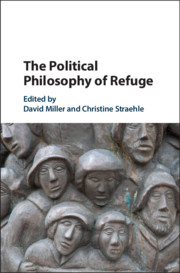Book contents
- The Political Philosophy of Refuge
- The Political Philosophy of Refuge
- Copyright page
- Contents
- Contributors
- Introduction
- Chapter 1 Differentiating Refugees
- Chapter 2 The State’s Right to Exclude Asylum-Seekers and (Some) Refugees
- Chapter 3 Asylum, Speech, and Tragedy
- Chapter 4 Border Rescue
- Chapter 5 Selecting Refugees
- Chapter 6 Refugees and the Right to Remain
- Chapter 7 The Duties of Refugees
- Chapter 8 Is Return the Preferred Solution to Refugee Crises?
- Chapter 9 Refugees and the Right to Return
- Chapter 10 Refugees, Rescue, and Choice
- Chapter 11 Philosophical Foundations for Complementary Protection
- Chapter 12 The Ethics of Sanctuary Policies in Liberal Democratic States
- Bibliography
- Index
Chapter 12 - The Ethics of Sanctuary Policies in Liberal Democratic States
Published online by Cambridge University Press: 01 November 2019
- The Political Philosophy of Refuge
- The Political Philosophy of Refuge
- Copyright page
- Contents
- Contributors
- Introduction
- Chapter 1 Differentiating Refugees
- Chapter 2 The State’s Right to Exclude Asylum-Seekers and (Some) Refugees
- Chapter 3 Asylum, Speech, and Tragedy
- Chapter 4 Border Rescue
- Chapter 5 Selecting Refugees
- Chapter 6 Refugees and the Right to Remain
- Chapter 7 The Duties of Refugees
- Chapter 8 Is Return the Preferred Solution to Refugee Crises?
- Chapter 9 Refugees and the Right to Return
- Chapter 10 Refugees, Rescue, and Choice
- Chapter 11 Philosophical Foundations for Complementary Protection
- Chapter 12 The Ethics of Sanctuary Policies in Liberal Democratic States
- Bibliography
- Index
Summary
States offer refuge in multiple ways, one of which is in the form of ‘sanctuary’. As the term is used colloquially, ‘sanctuary’ refers to a set of policies or actions that offer a range of forms of protection to people whose immigration status is precarious in some way. In particular, sanctuary is a type of refuge offered not to refugees, who are typically legally present in a state, but rather to those who may have fallen afoul of a state’s immigration rules. These individuals can include temporary labour migrants, whose short-term work visas have expired, refugee claimants, failed asylum-seekers and others who may be under deportation orders, members of mixed-status families (in particular where undocumented parents have citizen children), as well as stateless individuals. Usually, sanctuary is provided to individuals by sub-state authorities, to protect individuals who – absent sanctuary – would struggle to access a variety of services legally or safely, some of which may be essential to protecting their human rights. Many policies are justified as sanctuary policies, and it is my goal in this chapter to argue that the vast majority of them can be defended in current democratic states.
- Type
- Chapter
- Information
- The Political Philosophy of Refuge , pp. 231 - 251Publisher: Cambridge University PressPrint publication year: 2019
- 7
- Cited by

